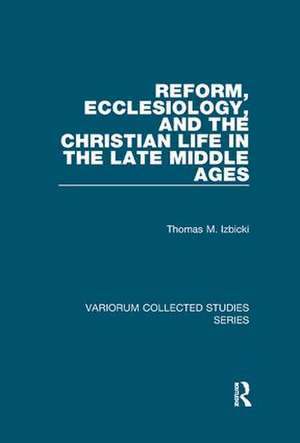Reform, Ecclesiology, and the Christian Life in the Late Middle Ages: Variorum Collected Studies
Autor Thomas M. Izbickien Limba Engleză Paperback – 10 iun 2019
Din seria Variorum Collected Studies
-
 Preț: 313.38 lei
Preț: 313.38 lei -
 Preț: 311.41 lei
Preț: 311.41 lei -
 Preț: 299.55 lei
Preț: 299.55 lei -
 Preț: 325.68 lei
Preț: 325.68 lei -
 Preț: 406.12 lei
Preț: 406.12 lei -
 Preț: 311.18 lei
Preț: 311.18 lei -
 Preț: 325.31 lei
Preț: 325.31 lei -
 Preț: 396.01 lei
Preț: 396.01 lei - 9%
 Preț: 1039.89 lei
Preț: 1039.89 lei -
 Preț: 266.20 lei
Preț: 266.20 lei -
 Preț: 343.34 lei
Preț: 343.34 lei - 9%
 Preț: 938.10 lei
Preț: 938.10 lei -
 Preț: 351.48 lei
Preț: 351.48 lei - 9%
 Preț: 938.86 lei
Preț: 938.86 lei -
 Preț: 335.37 lei
Preț: 335.37 lei - 9%
 Preț: 937.14 lei
Preț: 937.14 lei -
 Preț: 351.42 lei
Preț: 351.42 lei -
 Preț: 320.00 lei
Preț: 320.00 lei - 38%
 Preț: 766.84 lei
Preț: 766.84 lei - 23%
 Preț: 315.48 lei
Preț: 315.48 lei - 36%
 Preț: 740.06 lei
Preț: 740.06 lei - 34%
 Preț: 764.20 lei
Preț: 764.20 lei - 39%
 Preț: 684.75 lei
Preț: 684.75 lei - 29%
 Preț: 247.40 lei
Preț: 247.40 lei - 37%
 Preț: 488.89 lei
Preț: 488.89 lei - 38%
 Preț: 766.91 lei
Preț: 766.91 lei - 34%
 Preț: 769.51 lei
Preț: 769.51 lei - 38%
 Preț: 769.85 lei
Preț: 769.85 lei - 36%
 Preț: 823.43 lei
Preț: 823.43 lei - 25%
 Preț: 225.28 lei
Preț: 225.28 lei - 25%
 Preț: 225.54 lei
Preț: 225.54 lei - 34%
 Preț: 767.07 lei
Preț: 767.07 lei - 34%
 Preț: 764.20 lei
Preț: 764.20 lei - 34%
 Preț: 736.38 lei
Preț: 736.38 lei - 34%
 Preț: 738.43 lei
Preț: 738.43 lei - 25%
 Preț: 226.52 lei
Preț: 226.52 lei - 33%
 Preț: 491.66 lei
Preț: 491.66 lei - 34%
 Preț: 485.78 lei
Preț: 485.78 lei - 34%
 Preț: 485.78 lei
Preț: 485.78 lei - 38%
 Preț: 766.34 lei
Preț: 766.34 lei - 36%
 Preț: 739.17 lei
Preț: 739.17 lei - 31%
 Preț: 473.94 lei
Preț: 473.94 lei - 18%
 Preț: 843.63 lei
Preț: 843.63 lei - 38%
 Preț: 774.91 lei
Preț: 774.91 lei - 38%
 Preț: 769.92 lei
Preț: 769.92 lei - 34%
 Preț: 764.20 lei
Preț: 764.20 lei - 50%
 Preț: 488.81 lei
Preț: 488.81 lei - 36%
 Preț: 488.49 lei
Preț: 488.49 lei - 34%
 Preț: 769.10 lei
Preț: 769.10 lei - 38%
 Preț: 766.99 lei
Preț: 766.99 lei
Preț: 192.39 lei
Preț vechi: 231.61 lei
-17% Nou
Puncte Express: 289
Preț estimativ în valută:
36.82€ • 38.30$ • 30.40£
36.82€ • 38.30$ • 30.40£
Carte tipărită la comandă
Livrare economică 15-29 aprilie
Preluare comenzi: 021 569.72.76
Specificații
ISBN-13: 9781138382398
ISBN-10: 1138382396
Pagini: 286
Dimensiuni: 150 x 224 mm
Greutate: 0.53 kg
Ediția:1
Editura: Taylor & Francis
Colecția Routledge
Seria Variorum Collected Studies
Locul publicării:Oxford, United Kingdom
ISBN-10: 1138382396
Pagini: 286
Dimensiuni: 150 x 224 mm
Greutate: 0.53 kg
Ediția:1
Editura: Taylor & Francis
Colecția Routledge
Seria Variorum Collected Studies
Locul publicării:Oxford, United Kingdom
Cuprins
Contents: Foreword; Part 1 Reform: Reform and obedience in 4 conciliar sermons by Leonardo Dati, OP; The sins of the clergy in Juan de Torquemada's Defense of the Revelations of Saint Birgitta; Forbidden colors in the regulation of clerical dress from the 4th Lateran Council (1215) to the time of Nicolas of Cusa (d.1464). Part 2 Ecclesiology: The Immaculate Conception and ecclesiastical politics from the Council of Basel to the Council of Trent: the Dominicans and their foes; A papalist reading of Gratian: Juan de Torquemada on c. Quodcunque [C. 24 q. 1 c. 6]; Cajetan's attack on parallels between church and state; Representation in Nicholas of Cusa; An ambivalent papalism: Peter in the sermons of Nicholas of Cusa; 'Their Cardinal Cusanus': Nicholas of Cusa in Tudor and Stuart polemics; Reject Aneas!: Pius II on the errors of his youth. Part 3 The Christian Life: Leonardo Dati's sermon on the Circumcision of Jesus (1417); Juan de Torquemada's defense of the conversos; Nicholas of Cusa and the Jews; The origins of the De ornato mulierum of Antonius of Florence; Salamancan relectiones in the Fernán Núñez collection; Addenda et corrigenda; Index.
Notă biografică
Thomas M. Izbicki is Humanities Librarian, Alexander Library, Rutgers University, USA.
Recenzii
’This volume is an impressive and useful compilation, and will be a great stimulus to future research in the areas represented in the various essays.’ Sixteenth Century Journal
Descriere
The present studies deal with issues of reform, ecclesiology and the living of the Christian life in the late Middle Ages. Among the issues covered are the canonization of Birgitta of Sweden, the status of converts from Judaism in Spain, acceptable forms of dress for clergy and laity, and the obedience due the pope. Other studies are concerned with the writings of Spanish theologians about the indigenous populations of the New World and the use of the name of Nicholas of Cusa by Elizabethan and Jacobean writers in polemics concerning right religious teaching and submission to the English crown.
